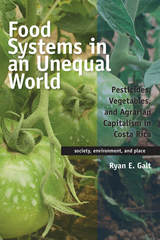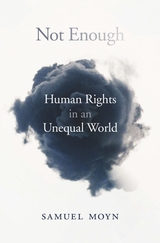
Food Systems in an Unequal World examines the agrochemical-dependent agriculture of Costa Rica and how its uneven regulation in export versus domestic markets affects Costa Rican vegetable farmers. Examining pesticide-dependent vegetable production within two food systems, the author shows that pesticide use is shaped by three main forces: agrarian capitalism, the governance of food systems throughout the commodity chain, and ecological dynamics driving local food production. Those processes produce unequal outcomes that disadvantage less powerful producers who have more limited choices than larger farmers, who usually have access to better growing environments and thereby can reduce pesticide use and production costs.

“No one has written with more penetrating skepticism about the history of human rights.”
—Adam Kirsch, Wall Street Journal
“Moyn breaks new ground in examining the relationship between human rights and economic fairness.”
—George Soros
The age of human rights has been kindest to the rich. While state violations of political rights have garnered unprecedented attention in recent decades, a commitment to material equality has quietly disappeared. In its place, economic liberalization has emerged as the dominant force. In this provocative book, Samuel Moyn considers how and why we chose to make human rights our highest ideals while simultaneously neglecting the demands of broader social and economic justice.
Moyn places the human rights movement in relation to this disturbing shift and explores why the rise of human rights has occurred alongside exploding inequality.
“Moyn asks whether human-rights theorists and advocates, in the quest to make the world better for all, have actually helped to make things worse… Sure to provoke a wider discussion.”
—Adam Kirsch, Wall Street Journal
“A sharpening interrogation of the liberal order and the institutions of global governance created by, and arguably for, Pax Americana… Consistently bracing.”
—Pankaj Mishra, London Review of Books
“Moyn suggests that our current vocabularies of global justice—above all our belief in the emancipatory potential of human rights—need to be discarded if we are work to make our vastly unequal world more equal… [A] tour de force.”
—Los Angeles Review of Books
READERS
Browse our collection.
PUBLISHERS
See BiblioVault's publisher services.
STUDENT SERVICES
Files for college accessibility offices.
UChicago Accessibility Resources
home | accessibility | search | about | contact us
BiblioVault ® 2001 - 2024
The University of Chicago Press









